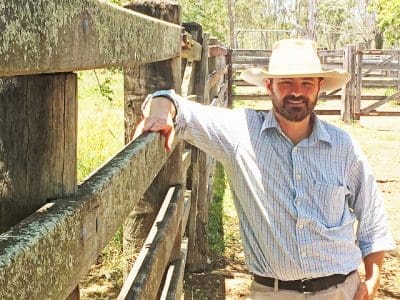QUEENSLAND cattle producers are being called on to participate in a research program testing smart sensor technology as a means of preventing and detecting stock theft.
In collaboration with AgForce, CQUniversity researchers are aiming to develop a new livestock monitoring system which can be used by landholders and law enforcement agencies to remotely monitor animals.

Associate professor Mark Trotter from CQUniversity
The 2001‐2002 National Farm Crime Survey conducted by the Australian Institute of Criminology found that livestock theft was the most commonly reported rural crime affecting six percent of farms, involving 186,777 animals with an estimated annual cost of $16 million.
However most incidents (65pc) go unreported and the true cost is more likely to be closer to $70 million a year.
“Stock theft can range from small incursions paring off a handful of animals from larger groups, all the way through to major criminal operations in which entire herds are mustered into portable yards and shipped out in semi‐trailers,” project leader, associate professor Mark Trotter said.
“In all cases the opportunity to steal is a result of the inability of the owner to constantly monitor the location and behaviour of their livestock,” he said.
CQUniversity’s Precision Livestock Management team is recognised as a national leader in the use of sensor technologies to enhance animal production. Dr Trotter will be collaborating with Professor Steve Moore from the university’s school of engineering and technology in adapting sensors for use on livestock, and with Dr Stuart Charters of New Zealand’s Lincoln University, who is an expert in data management and visualisation.
“One of the limitations of the National Livestock Identification System is that the location of an animal is only sporadically known when the tags are checked when livestock are bought, sold or moved along the production chain – animal data cannot be accessed remotely or in real‐time,” Dr Trotter said.
The research group has designed a generic animal sensing platform with GPS location to monitor animal movement that will be tested in stock theft simulations at AgForce’s Belmont Research Station.
At the outset of the program, CQUniversity will host a workshop with producers directly affected by stock theft to gain insights into the types of behaviour, both criminal and animal, that could be recorded during stock theft, as well as feedback on how on‐animal data could be best be relayed to these end‐users in a meaningful manner.
- Source: CQU. For more information on participating in a producer workshop, contact Mark Trotter – email m.trotter@cqu.edu.au



Here’s an idea, send me out a second matching NLIS transponder in the same form as a HGP implant with my NLIS tag order. I already have the tools to implant them, the processing plants have the technology to detect the implants by way of the metal detection, race reading of NLIS and wands are all set up across Australia. A miss match of the tags would instantly alert there is a problem.
Would like to keep more on how the system would work and cost for larger mobs